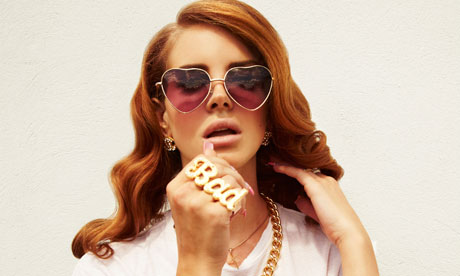Thanks to the arrival of Spotify in Australia (whose incredibly annoying ads have already pretty much completely driven me away) I've been listening to a couple of albums that I would never have actually bought, or gone to the trouble of chasing on Youtube. This is a bit of a problem, seeing as it posts everything you listen to on Facebook. Everyone now knows I've been listening to Lana Del Rey.
I heard her breakout hit, Videogames, on Youtube with everyone else, and loved it as much as everyone seemed to. Her stoner-seductive aesthetic, with the naturally accompanying bored, weed-husky voice, went nicely with the hypnotic smoke-haze looping of the song itself. When she was 'unmasked' as nowhere near as trailer-trash as we'd been meant to think, well, that seemed to work pretty well too. Somehow, rich girl fantasising about life on the hood of a pick-up truck seemed just even more fitting--probably because the music was already way more about fantasy than reality. By the time we found out she couldn't really sing live, the fact could hardly have been less relevant. It just added to the spectacle.
So anyway now I've been listening, the past few days, to the album, which she (or They) have called "Born to Die." It's a predictably top-heavy record: three of the first four tracks are singles, and only one of the remaining eleven. Maybe this goes without saying--no-one expected this to be anything but a pop album. More interestingly, it's also an album that is single-mindedly devoted to character. Throughout, the songs work to build Del Rey's character. The first track, also called "Born to Die," opens with a flourish of strings, then a beat and some backup singer sighing. When Del Rey's voice comes in, it has all the bored/seductive resonance "Video Games" lead us to expect, that combination of fate and apathy. The lyrics, like the music itself, are a baroque redux of Video Games' sexy-stoner imagery. "Video Games" had the flirt of "I heard that you like the bad girls / Honey, is that true?" "Born to Die" has the dragged out, ominous "You like your girls insaaane." Over the whole record, she doesn't break character once. It creates an aesthetic a friend of mine described as "Hollywood sadcore." Not sure whether that's actually his creation or not, but I think it's pretty perfect.
One aspect of that character that is played up on the record is Del Rey's (literal) flirting with innocence. "Video Games" had notes of this; I think one of the song's loveliest moments is the teasingly innocent lift in her voice as she sings the above quoted bad girls line. You don't need to be watching the clip to see her eyelids bat there. But this dynamic gets amped way up in a couple of songs here. I'm thinking "Off to the Races," a song heavy on lines quoted from Lolita. The song starts off muddy and weak, chugging on lines like "he loves me with every beat of his cocaine heart." But it kicks into gear when Del Rey lifts her voice into an innocent squeak and sings "Light of my life, fire of my loins / be a good girl and do what I want."
She channels a Lolita chacter all through the song, an the album as a whole. A later (weaker) track is actually for the book. And we realise something we might not quite have got earlier. Del Rey's character is not just bad girl: often, it is also bad little girl. Creepy. But everyone knows by now that it is all an act, all the way down. The flirts of faux-innocence scattered liberally through Born to Die are part of what lifts the performance into tasty madness. Lana Del Rey is a great fake mirage of dirty insanity. And that's what makes her album so entertaining.
Subscribe to:
Post Comments (Atom)



0 comments:
Post a Comment